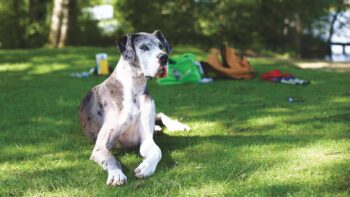Great Danes, the gentle giants of the dog world, are known for their impressive size, regal appearance, and surprisingly sweet dispositions. These majestic dogs often look like they’ve stepped out of a myth, with their towering stature and elegant stride. Despite their imposing size, Great Danes are famously friendly and affectionate, often considering themselves lap dogs—much to the surprise of their owners! They are playful, and loving, and make wonderful family companions. However, like all dogs, Great Danes eventually reach their senior years, even if they still think they’re puppies. Typically, a Great Dane is considered a senior around 6 to 7 years old, due to their shorter lifespan compared to smaller breeds. As they age, these gentle giants may slow down a bit, trading their playful romps for more restful activities. Let’s explore the different stages of a Great Dane’s life and see how these magnificent dogs age with grace, humor, and a lot of love.
1. The Puppy Phase: Giant Puppies, Giant Fun
In the first year of a Great Dane’s life, they are giant bundles of energy, curiosity, and a touch of clumsiness. Great Dane puppies grow rapidly, often gaining several pounds a week, which can make them hilariously awkward as they try to coordinate their long legs and large paws. This phase is characterized by lots of play, chewing (on anything and everything), and an unending appetite for food and fun. Despite their size, Great Dane puppies are incredibly affectionate and crave human interaction. Training is crucial during this phase to ensure they grow into well-behaved adults, especially since an untrained giant dog can be quite a handful. Puppyhood is a time of joy and discovery, with Great Danes charming everyone they meet with their playful antics and loving nature.
2. The Adolescent Years: The Teen Titan
From around 1 to 2 years old, Great Danes enter their adolescent phase, often referred to as the “teenage years.” During this time, they continue to grow and can sometimes be a bit rebellious as they test boundaries. Adolescent Great Danes are still full of energy and enthusiasm but may also display some stubbornness, making consistent training and socialization important. They are playful and enjoy engaging in activities that challenge them physically and mentally. Despite their size and sometimes aloof demeanor, they remain affectionate and enjoy spending time with their families. This phase can be a bit challenging as they navigate their rapidly growing bodies and newfound independence, but it’s also a time of great bonding and fun.
3. The Prime Years: Majestic and Mellow
Between 2 and 5 years old, Great Danes are in their prime. These years are characterized by a balance of energy and maturity. Great Danes in their prime are confident, strong, and often have a more relaxed and mellow attitude compared to their younger years. They are still playful but are also happy to lounge around the house, often taking up an entire couch or bed. This is the time when their majestic appearance and gentle nature truly shine. They are protective of their families and can be excellent watchdogs, though they are generally friendly and good-natured. The prime years are a time of calm and contentment, with Great Danes enjoying a mix of playtime and relaxation with their loved ones.
4. The Middle Ages: A Gentle Giant Slowing Down
Around 5 to 7 years old, Great Danes start to enter their middle-aged years. During this time, they may begin to slow down slightly, preferring more moderate activities over the intense play they once loved. This phase often brings a more laid-back and relaxed attitude, although they still enjoy walks and playtime. Great Danes may start to show signs of aging, such as graying fur around the muzzle and a decrease in stamina. Despite these changes, they remain affectionate and devoted companions, enjoying the company of their families. Middle-aged Great Danes often become more cuddly and content with lounging around, making them perfect for quiet evenings at home.
5. The Senior Years: Gentle Giants with Wisdom
By the time a Great Dane reaches 6 to 7 years old, they are generally considered seniors. This phase is marked by a noticeable reduction in energy levels and a greater appreciation for relaxation and comfort. Senior Great Danes may develop age-related health issues such as arthritis, hip dysplasia, or heart problems, which can affect their mobility and overall well-being. However, their loving and gentle nature often remains unchanged, and they continue to bring joy to their families. They enjoy gentler activities, like short walks and plenty of cuddle time, often seeking out the coziest spots in the house for naps. Their bond with their human companions deepens, and they often become even more affectionate as they age.
Great Danes, with their impressive size and loving hearts, bring joy and companionship at every stage of life. From the playful puppy phase to the gentle senior years, these dogs are full of character, grace, and affection. While they may slow down as they age, their loyal nature and loving spirit never fade. Each stage offers unique experiences and memories, making life with a Great Dane a heartwarming and delightful journey. Whether they’re lounging on the couch or going for a leisurely walk, Great Danes have a special way of making every moment count. So, cherish every stage with your Great Dane, and enjoy the endless love and joy they bring into your life, from their towering puppy days to their golden years.
Frequently Asked Questions Someone Might Have About Their Aging Great Dane
The post When Does a Great Dane Reach Old Age? appeared first on iHeartDogs.com.

